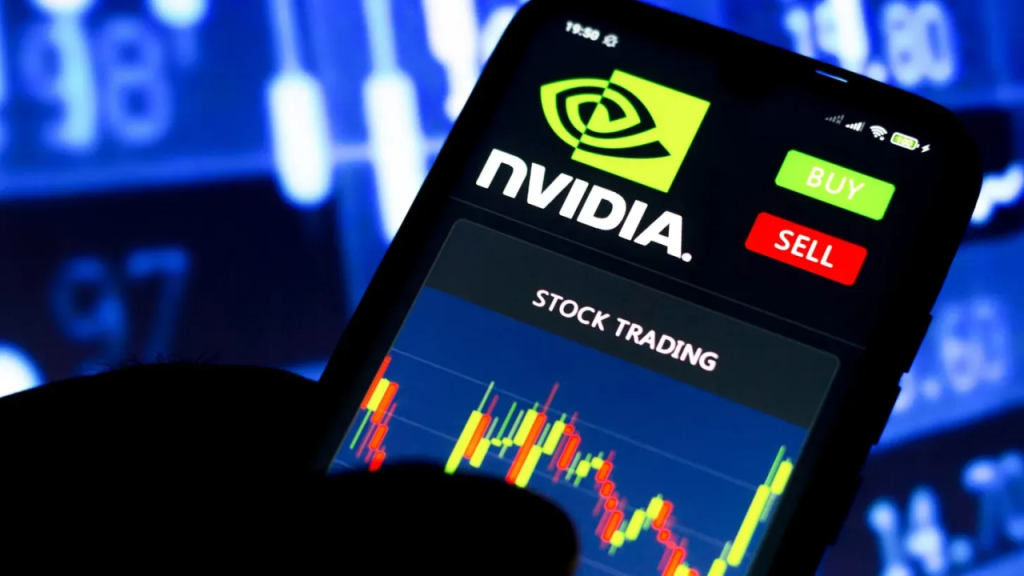
Artificial intelligence (AI) has become the driving force behind technological advancements, transforming industries and fueling the rapid rise of US tech stocks. However, the recent Nvidia sell-off has raised concerns among investors. 📉🤔💡
Why did Nvidia’s stock experience a sharp decline despite its strong market presence? How do AI innovations continue to shape the financial future of tech companies?
These questions are at the heart of ongoing market discussions. Nvidia’s recent stock dip, caused by supply chain constraints, slower AI adoption rates, and investor profit-taking, offers key lessons on volatility in AI-driven stocks. Let’s explore the broader impact AI has on US tech stocks and what investors can learn from this correction. 📊
How AI Innovations Drive Tech Stock Growth 🚀
The Surge in AI Chip Demand
The rapid rise of AI has pushed demand for high-performance semiconductor chips to new heights. Companies like Nvidia, AMD, and Intel have capitalized on this growth, providing cutting-edge processors that power AI models. However, this boom has also introduced challenges: ⚠️
- Supply chain constraints have slowed production, leading to concerns over scalability.
- Regulatory barriers, such as US restrictions on AI chip exports to China, may limit market expansion.
- High competition among semiconductor companies could lead to pricing pressures in the long run.
AI’s Expanding Role in Cloud & Software ☁️
Tech giants like Microsoft, Google, and Amazon continue to leverage AI in cloud computing, automation, and cybersecurity. AI-driven solutions enhance business efficiency, but regulatory scrutiny and ethical concerns around AI implementation could impact their growth trajectory.
Moreover, recent earnings reports from major cloud providers indicate sustained investment in AI, highlighting its role as a critical component of future technological infrastructure. 📊
AI-Driven Market Speculation 💡
While AI innovations drive real economic value, stock market trends often reflect a mix of hype and speculation. Many AI-focused companies experience:
- Extreme valuation surges, fueled by investor enthusiasm.
- Short-term price volatility, as retail and institutional investors react to AI-related news.
- Potential market corrections, as seen in the Nvidia sell-off, where overinflated prices adjust to more sustainable levels.
Lessons from the Nvidia Sell-Off 🤔
What Led to the Market Correction?
Nvidia, despite its dominance in AI chips, faced a notable stock dip. Key reasons include: 📉
- Profit-taking by investors after an extended rally.
- Macroeconomic concerns, such as rising interest rates, affecting high-growth stocks.
- Overbought market conditions, making a correction inevitable.
- High expectations that, when unmet, led to investor disappointment.
While Nvidia remains a leader in AI, this sell-off underscores the volatility of tech stocks, reminding investors to assess valuations carefully. 📢
Risk Management for AI Investors 💰

How can investors safeguard their portfolios from AI stock volatility? Here are some key strategies: 💡
- Diversification is key – Don’t concentrate investments in AI stocks alone; balance with other tech and non-tech assets.
- Monitor valuation metrics – Keep an eye on P/E ratios, revenue growth projections, and market sentiment.
- Stay informed on macroeconomic factors – Interest rates, inflation, and government policies play a crucial role in tech stock performance.
- Understand regulatory risks – US-China trade restrictions on AI chips could impact key companies’ long-term growth potential.
Long-Term AI Investment Strategies 📈
AI remains one of the most promising sectors for future growth, but investors should adopt a strategic approach to maximize returns while mitigating risk:
- Focus on sustainable growth – AI has long-term potential, but avoid investing solely based on hype.
- Identify strong AI leaders – Look for companies with financial stability, continuous innovation, and clear AI monetization strategies.
- Consider ETFs for risk reduction – AI-themed ETFs can offer diversified exposure to AI-driven stocks.
- Stay updated on AI breakthroughs and policies – Government regulations and emerging competitors can significantly impact market trends. 💰
Conclusion 📉📈
The Nvidia sell-off serves as a valuable lesson for AI investors. While AI innovations continue to shape the future, stock market volatility is inevitable. To navigate this landscape, investors should focus on solid fundamentals, risk management strategies, and long-term growth potential rather than short-term market swings.
Subscribe to Our Newsletter for Exclusive Updates and Insights
By subscribing, you’ll gain access to a treasure trove of valuable content delivered straight to your inbox. Stay ahead of the curve with expert articles, insider tips, and thought-provoking resources carefully curated by our team of professionals. Whether you’re a seasoned enthusiast or just getting started, our newsletter is a must-have resource for staying informed and inspired.
